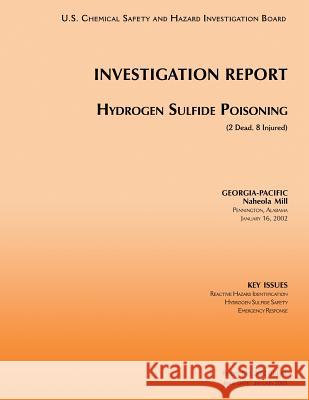Investigation Report: Hydrogen Sulfide Poisoning: (2 Dead, 8 Injured) » książka
Investigation Report: Hydrogen Sulfide Poisoning: (2 Dead, 8 Injured)
ISBN-13: 9781500502300 / Angielski / Miękka / 2014 / 54 str.
This investigation report examines a hydrogen sulfide poisoning incident that occurred on January 16, 2002, at the Georgia- Pacific Naheola mill in Pennington, Alabama. Two contractors were killed, and eight were injured. County paramedics reported symp- toms of hydrogen sulfide exposure. This report identifies the root and contributing causes of the incident and makes recommendations on reactive hazard identification, hydrogen sulfide safety, and emer- gency response. The U.S. Chemical Safety and Hazard Investigation Board (CSB) is an independent Federal agency whose mission is to ensure the safety of workers, the public, and the environment by investigating and preventing chemical incidents. CSB is a scientific investigative organization; it is not an enforcement or regulatory body. Established by the Clean Air Act Amendments of 1990, CSB is responsible for determining the root and comtributing causes of accidents, issuing safety recommendations, studying chemical safety issues, and evaluating the effectiveness of other government agencies involved in chemical safety. No part of the conclusions, findings, or recom- mendations of CSB relating to any chemical incident may be admitted as evidence or used in any action or suit for damages arising out of any matter mentioned in an investigation report (see 42 U.S.C. 412 r] 6] G]). CSB makes public its actions and decisions through investigation reports, summary reports, safety bulletins, safety recom- mendations, special technical publications, and statistical reviews. More information about CSB may be found at www.chemsafety.gov."
Zawartość książki może nie spełniać oczekiwań – reklamacje nie obejmują treści, która mogła nie być redakcyjnie ani merytorycznie opracowana.











